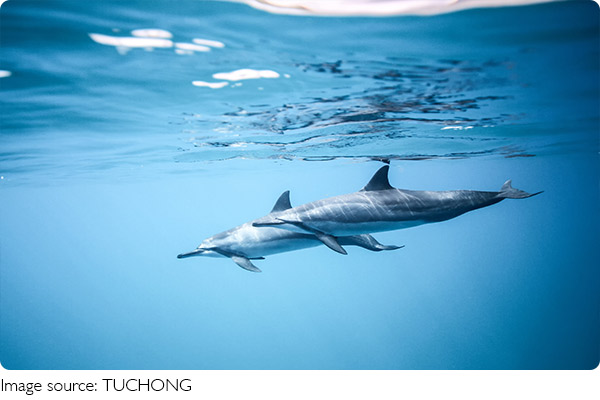Dolphin Show Secrets

Whether it's jumping through hoops or flipping in the air, dolphins never fail to impress. But have you ever wondered why they can do all these tricks so well in front of people?
Are they just naturally playful—or is there something more going on? Let's dive into the fascinating world of dolphin performances and find out what makes them such amazing show stars.
They're Incredibly Smart Animals
First and foremost, dolphins are known for their high intelligence. Their brains are large and complex, especially in the parts linked to memory, problem-solving, and emotions. They can understand instructions, recognize themselves in mirrors, and even learn behaviors from one another.
That intelligence makes them excellent learners. They can quickly connect a sound or hand signal with a specific action—like jumping, spinning, or waving a fin.
They Respond to Positive Training
Dolphins are trained using a method called positive reinforcement. That means when they do something correctly, they get a reward—often a tasty fish, a rub, or a favorite toy. If they don't want to perform, trainers never punish them. Instead, they just wait until the dolphin is ready again.
Over time, dolphins learn that performing tricks brings fun and rewards. Since they're naturally curious and playful, many actually enjoy the interaction.

They Love to Play
In the wild, dolphins are naturally playful animals. They chase each other, ride waves, play with seaweed, and even surf alongside boats. This playful nature makes it easier for them to enjoy and engage with games and routines set by trainers.
When dolphins leap through the air or balance balls in shows, those actions aren't too far from what they do on their own. The main difference is that now they're doing it with a human partner—and a cheering crowd!
They Form Strong Bonds with Humans
Dolphins are social creatures. In the ocean, they live in tight-knit groups called pods. In aquariums or marine parks, they often develop similar close bonds with their trainers. Many trainers work with the same dolphins for years, building trust day by day.
This trust plays a big role in performances. Dolphins aren't forced—they choose to perform, often enjoying the connection and attention. When the relationship is strong, dolphins respond more eagerly and confidently during shows.
Communication Is the Key
Trainers use special whistles, hand signals, and body language to communicate with dolphins. Each signal matches a specific action. Over time, dolphins learn to recognize dozens of cues, allowing them to perform full routines with multiple moves.
Because dolphins have excellent hearing and memory, they can respond quickly and accurately—even in front of large, noisy crowds.
They Have Great Physical Ability
Let's not forget that dolphins are built for performance. Their streamlined bodies and powerful tails allow them to leap high and swim fast. Their strong muscles and flexible spines give them the agility needed for flips, twists, and synchronized moves.
So when they perform a high jump or backflip, it's not just trained behavior—it's also pure physical talent.

Are Dolphin Shows Ethical?
This is a question many people ask. Some believe dolphins belong only in the wild, while others support marine parks for education and conservation. What's most important is that any facility caring for dolphins ensures they're healthy, enriched, and treated with respect.
We should always look for programs that focus on ethical care, animal welfare, and scientific understanding—not just entertainment.
Let's Appreciate Dolphins the Right Way
Dolphins aren't just performers—they're intelligent, emotional, and deeply social beings. Their ability to perform in front of us is a result of their trust in humans, their love of play, and their natural brilliance.
Have you ever seen a dolphin show? What impressed you the most—the flips, the teamwork, or the way they connect with people? Let's share our experiences and keep learning about these incredible animals together!
-
 Super Cat JumpsThink Your Cat Can Handle Heights? The Shocking Truth About Their Jumping Power Might Surprise You!
Super Cat JumpsThink Your Cat Can Handle Heights? The Shocking Truth About Their Jumping Power Might Surprise You! -
 Why Cats Rub?Ever wondered why cats love rubbing against us? It's more than affection—here's what those cute head-bumps really mean!
Why Cats Rub?Ever wondered why cats love rubbing against us? It's more than affection—here's what those cute head-bumps really mean! -
 Trim Pet NailsNervous about trimming your pet’s nails? Follow these simple steps to keep them safe, calm, and injury-free at home!
Trim Pet NailsNervous about trimming your pet’s nails? Follow these simple steps to keep them safe, calm, and injury-free at home!